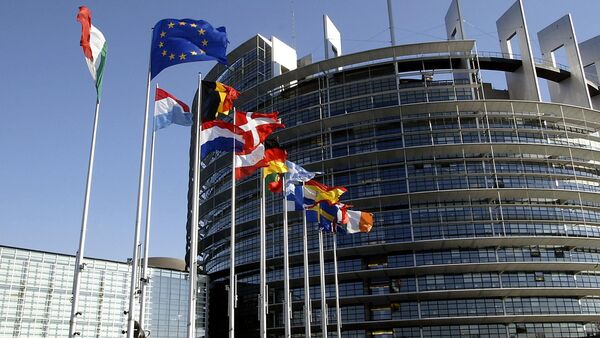The lower house of the Belarusian parliament expressed regret on Tuesday over calls for sanctions against Belarus from the Parliamentary Assembly of the Council of Europe.
The European Union imposed on Monday a travel ban on President Alexander Lukashenko and 157 other top Belarusian officials and froze their European assets over the crackdown. The decision was taken during a meeting of the European foreign ministers in Brussels.
PACE on Thursday called on all 47 Council of Europe member states to impose diplomatic sanctions on Belarus and not to recognize the results of the recent presidential polls.
A statement published on Tuesday the Belarusian National Assembly's website said "the practice of negotiating with a sovereign state using the language of sanctions, baseless claims and biased evaluations has run its course and proved that it has no future."
The Belarusian parliament noted "with regret" the approval of the resolution, whose "unbalanced and destructive character does not contribute to the development of mutual understanding between the Belarusian parliament and the PACE."
The Parliamentary Assembly said in its statement that it was "dismayed by the unprecedented wave of violence, intimidation, mass arrests and prosecution of political opponents, human rights defenders, media workers, students and citizens of Belarus" that followed the December 19 presidential elections in Belarus. It called on the Belarusian authorities to stop the prosecution of opposition activists and let the people to freely express their will.
The Belarusian elections saw incumbent President Lukashenko, who has ruled the country for more than 15 years, winning a fourth term in office with almost 80 percent of the vote.
More than 600 people were detained during large-scale protests that broke out in the capital, Minsk, following the polls that the opposition claimed were rigged. Most of the detainees have been charged with administrative offences but dozens of criminal cases have been initiated over the protests, including several against former presidential candidates.
The EU foreign ministers did not agree on whether economic sanctions should be imposed on Belarus.
Answering journalists' questions, EU foreign policy chief Catherine Ashton warned that economic sanctions could follow if Belarus does not meet the European Union's calls for the release of the detainees and for more democratic policies towards the opposition.
The European Union imposed economic sanctions and a travel ban on Belarus' political leadership following the 2006 presidential elections, which also saw police brutally dispersing opposition demonstrations in Minsk.
The Belarusian Foreign Ministry also issued a statement on Tuesday condemning unilateral sanctions against several Belarusian companies imposed by the United States on Monday.
The sanctions, the statement said, violate the United States' commitment not to introduce economic sanctions against Belarus envisaged in a bilateral memorandum signed in 1994 in Budapest.
MINSK, February 1 (RIA Novosti)


